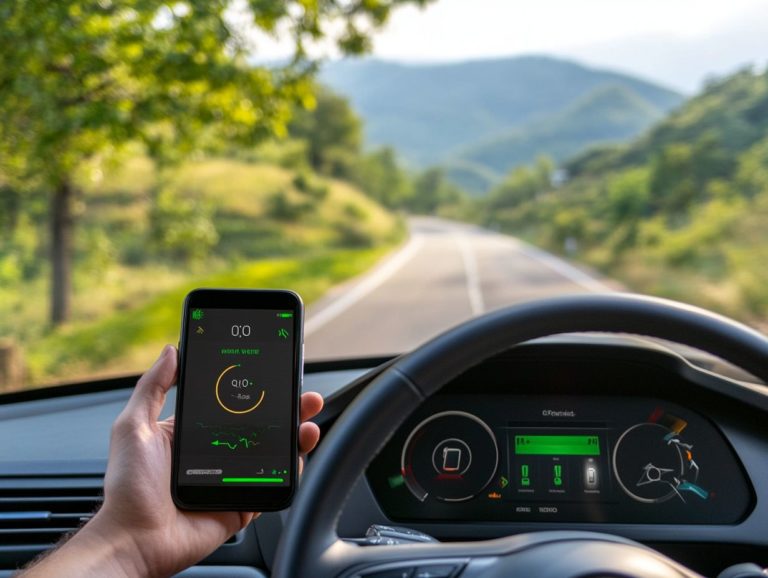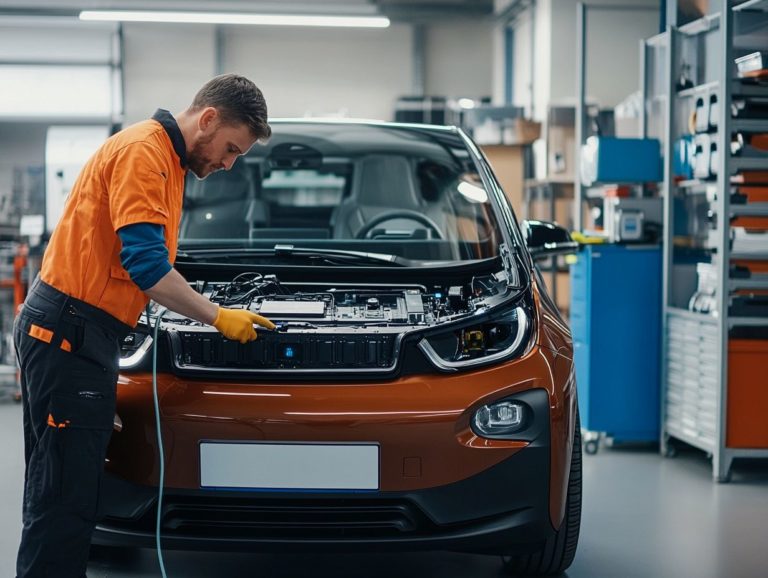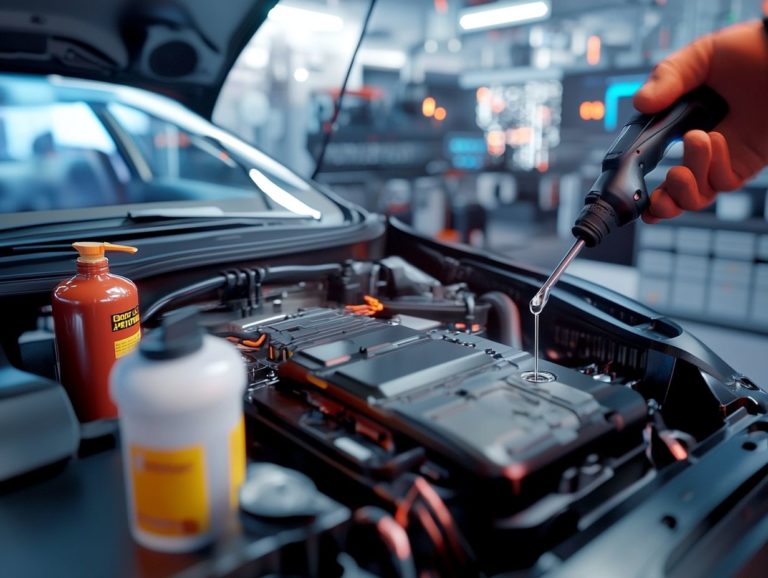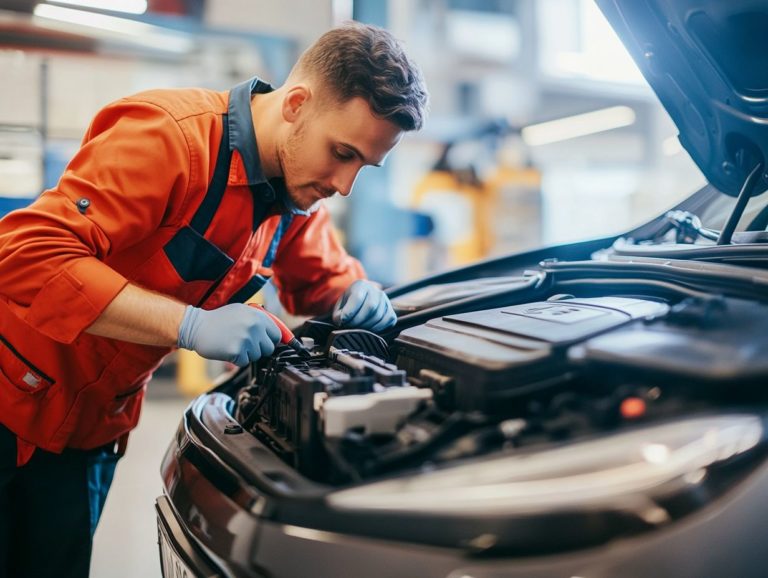Understanding EV Maintenance Costs
Electric vehicles (EVs) are becoming more popular. Understanding their maintenance requirements is crucial for both current and prospective owners.
This article delves into the essentials of EV maintenance. We will examine key factors that impact costs, including battery life, brake and tire replacements, and other necessary upkeep. You’ll find a comparison of these expenses with those of traditional gasoline cars, which highlights potential savings and trade-offs.
We’ll also provide practical tips to boost your EV’s performance and keep maintenance costs low.
Contents
- Key Takeaways:
- What is EV Maintenance?
- Factors Affecting EV Maintenance Costs
- Comparing EV Maintenance Costs to Gasoline Cars
- Tips for Reducing EV Maintenance Costs
- Frequently Asked Questions
- What are EV maintenance costs?
- How do EV maintenance costs compare to traditional gasoline cars?
- What types of maintenance tasks are necessary for EVs?
- Are there any potential cost-saving measures for EV maintenance?
- Do EVs have any maintenance requirements specific to their electric components?
- What should I consider when budgeting for EV maintenance costs?
Key Takeaways:
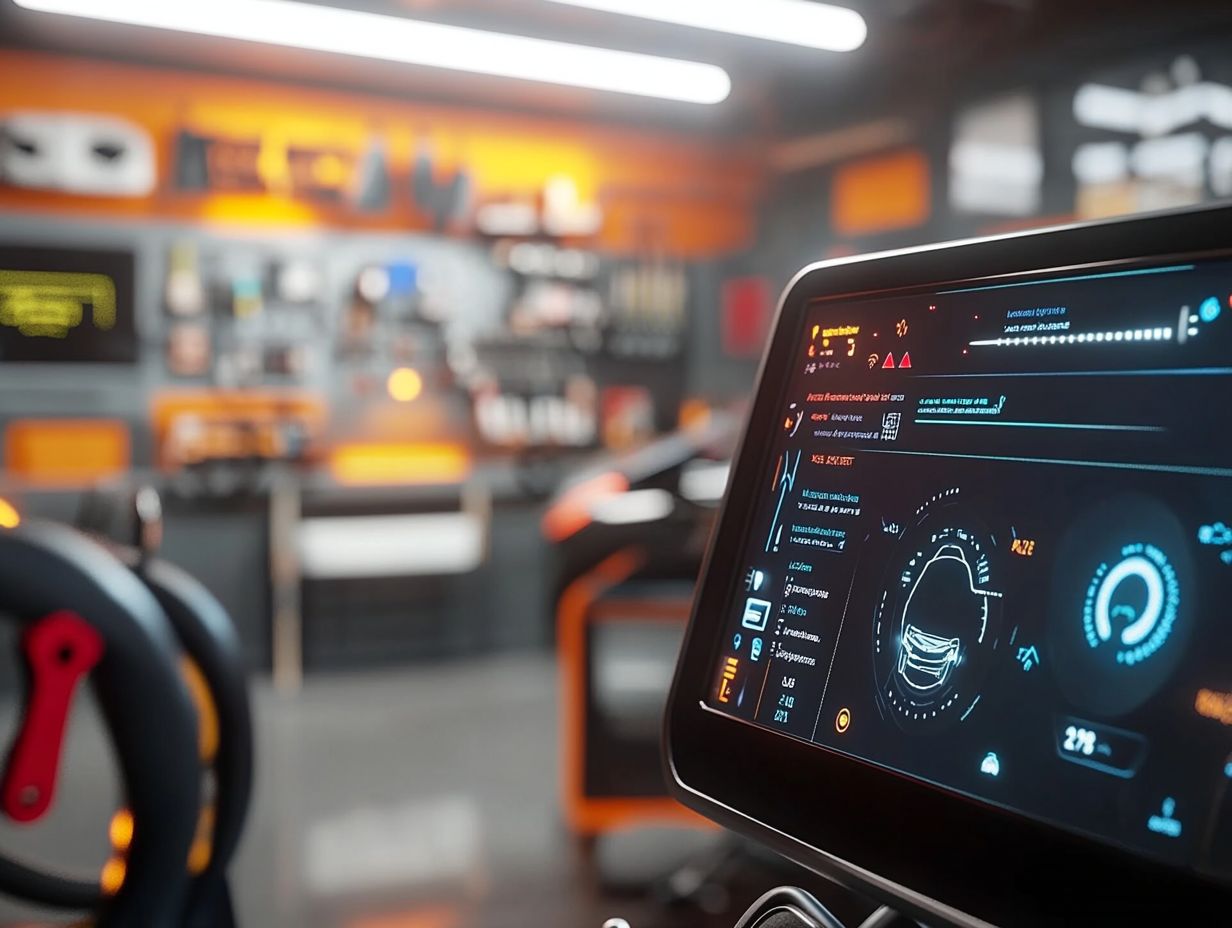
- Understanding EV maintenance is crucial for owning an electric vehicle.
- Key factors affecting EV maintenance costs include battery life, brake and tire replacements, and other maintenance needs.
- Compared to gasoline cars, EVs offer potential cost savings but may require trade-offs. Tips for reducing EV maintenance costs include maximizing battery life, proper tire maintenance, and other cost-saving strategies.
What is EV Maintenance?
EV maintenance is the careful process you engage in to care for your electric vehicle. This ensures it remains efficient and lasts for years to come. This approach differs significantly from the traditional methods used for gas-powered vehicles.
As the popularity of electric vehicles surges, understanding the unique aspects of EV maintenance is essential for owners who want to optimize performance and manage costs.
Unlike internal combustion engine vehicles, which demand regular oil changes and complex engine repairs, your focus with an electric car shifts to battery health, cooling systems, and other specialized components. Committing to preventive maintenance and following a structured schedule helps you manage wear and tear while keeping your vehicle performing at its best.
Factors Affecting EV Maintenance Costs
Several factors influence the maintenance costs of electric vehicles. Key considerations include battery replacement, cooling systems, and brake maintenance. Knowing these factors can help you save money and keep your EV in top shape!
As the automotive industry evolves, maintenance costs for electric vehicles may vary due to factors like component wear and tear and the vehicle’s overall design. By evaluating these aspects and understanding EV regulations and maintenance, you can prepare for the financial commitments that come with maintaining your electric vehicle.
Battery Life and Replacement
Battery life is a critical component of your electric vehicle’s maintenance. The efficiency and performance of the battery management system significantly impact the vehicle’s overall functionality.
By understanding the decline in battery performance over time, you can better manage your EV for optimal performance. Factors such as temperature changes, charging habits, and the number of charge cycles can diminish capacity, affecting your driving range and acceleration.
Recognizing these influences underscores the importance of adopting effective battery care practices. Avoiding extreme charge levels, using optimal charging stations, and regularly monitoring battery health are all essential steps. Implementing these strategies enhances your vehicle’s performance, extends the replacement timeline, and ultimately leads to reduced long-term costs while preserving the vehicle’s value.
Brake and Tire Replacements
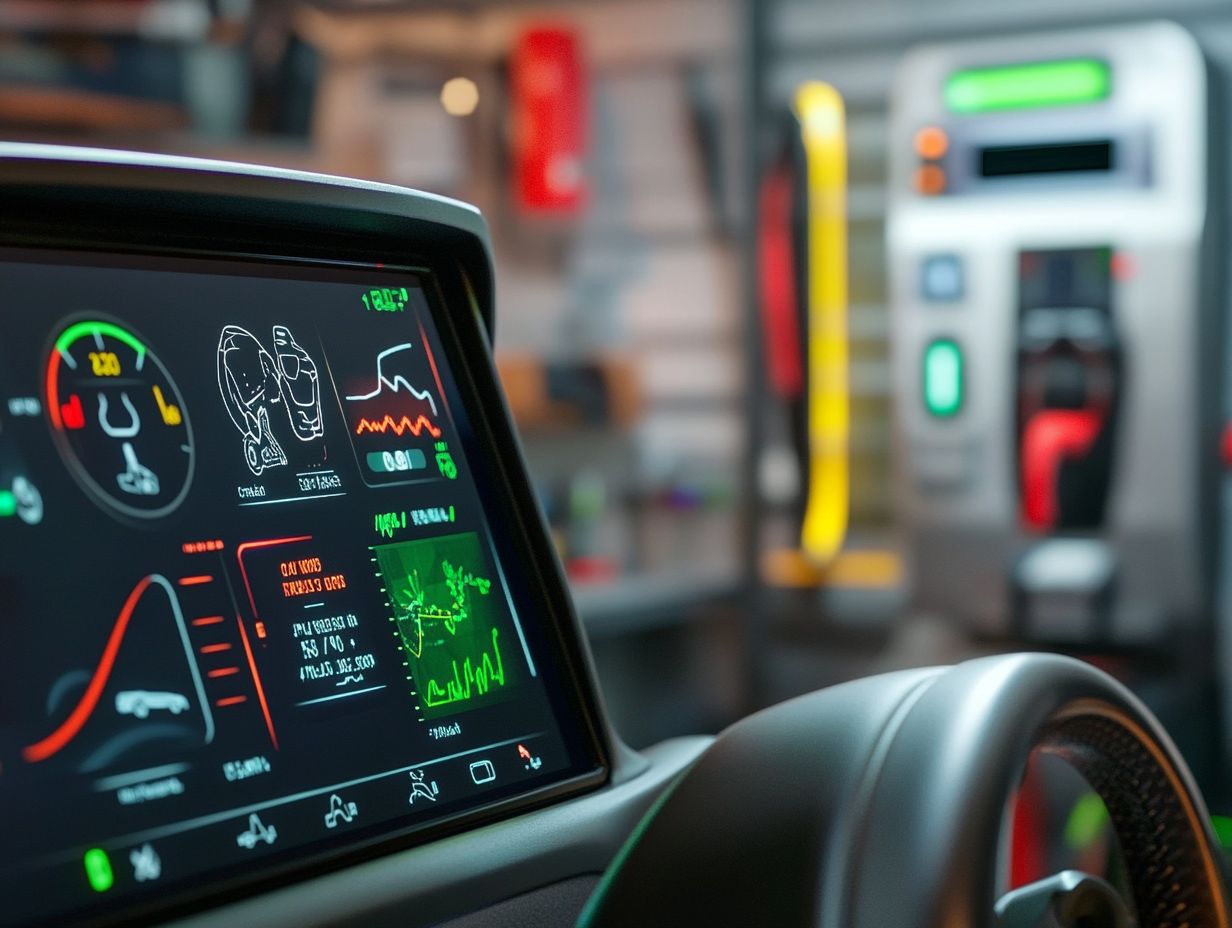
Brake and tire maintenance are crucial aspects of your electric vehicle (EV) upkeep. They significantly affect both safety and performance over time.
For electric vehicles, understanding brake systems is essential. Regenerative braking technology conserves energy by converting kinetic energy back into stored energy.
This system imposes unique demands on your brake components. Regularly inspect your brake pads and rotors to extend the lifespan of your braking system.
Maintaining optimal tire pressure is vital. If your tires are not inflated properly, it can make your car work harder, affecting efficiency and overall range.
This underscores the importance of a comprehensive approach to EV maintenance.
Other Maintenance Needs
Besides battery and brake care, your electric vehicle has various maintenance needs that are essential for reliability and performance.
Scheduled maintenance of cooling systems is critical for ensuring optimal temperatures. This directly contributes to battery efficiency and longevity.
Regular checks can prevent overheating an essential factor for maintaining the vehicle’s health. Whether you’re an enthusiast or simply a daily driver, engaging in preventive maintenance practices is key.
This includes assessing software updates and routinely checking tire pressure.
The automotive industry plays a pivotal role in shaping these maintenance protocols. They invest heavily in research to develop guidelines that enhance the EV experience.
This evolution reflects a commitment to sustainability and the growing adoption of electric vehicles worldwide.
Comparing EV Maintenance Costs to Gasoline Cars
When comparing the maintenance costs of electric vehicles (EVs) to gas-powered cars, distinct differences emerge. These differences significantly impact your ownership expenses and overall vehicle management.
Understanding these cost comparisons is essential for anyone considering the switch to an electric vehicle. It allows you to assess the long-term financial implications of your choice.
While the initial maintenance costs for EVs might appear lower thanks to fewer moving parts and the absence of regular oil changes, factors such as battery replacement and specific maintenance requirements can shift the balance. It’s important to be aware of these aspects and debunk common misconceptions by exploring understanding EV maintenance myths.
As the automotive industry continues to evolve, it becomes increasingly important to analyze trends that may influence these costs over time.
Cost Savings and What You Should Know
Electric vehicles offer enticing opportunities for cost savings in maintenance compared to their gas-powered counterparts. However, there are important trade-offs to consider.
With fewer moving parts, electric vehicle maintenance typically involves lower repair costs. The elimination of frequent oil changes contributes to overall savings.
You can expect fewer routine checks, which means less time spent at the mechanic’s.
However, battery replacement can become a substantial expense over time. Although charging infrastructure is advancing rapidly, its current limitations might affect your convenience and accessibility.
Weighing these factors is vital if you’re considering making the switch. Balancing the long-term financial benefits with potential challenges will help you make an informed decision.
Tips for Reducing EV Maintenance Costs
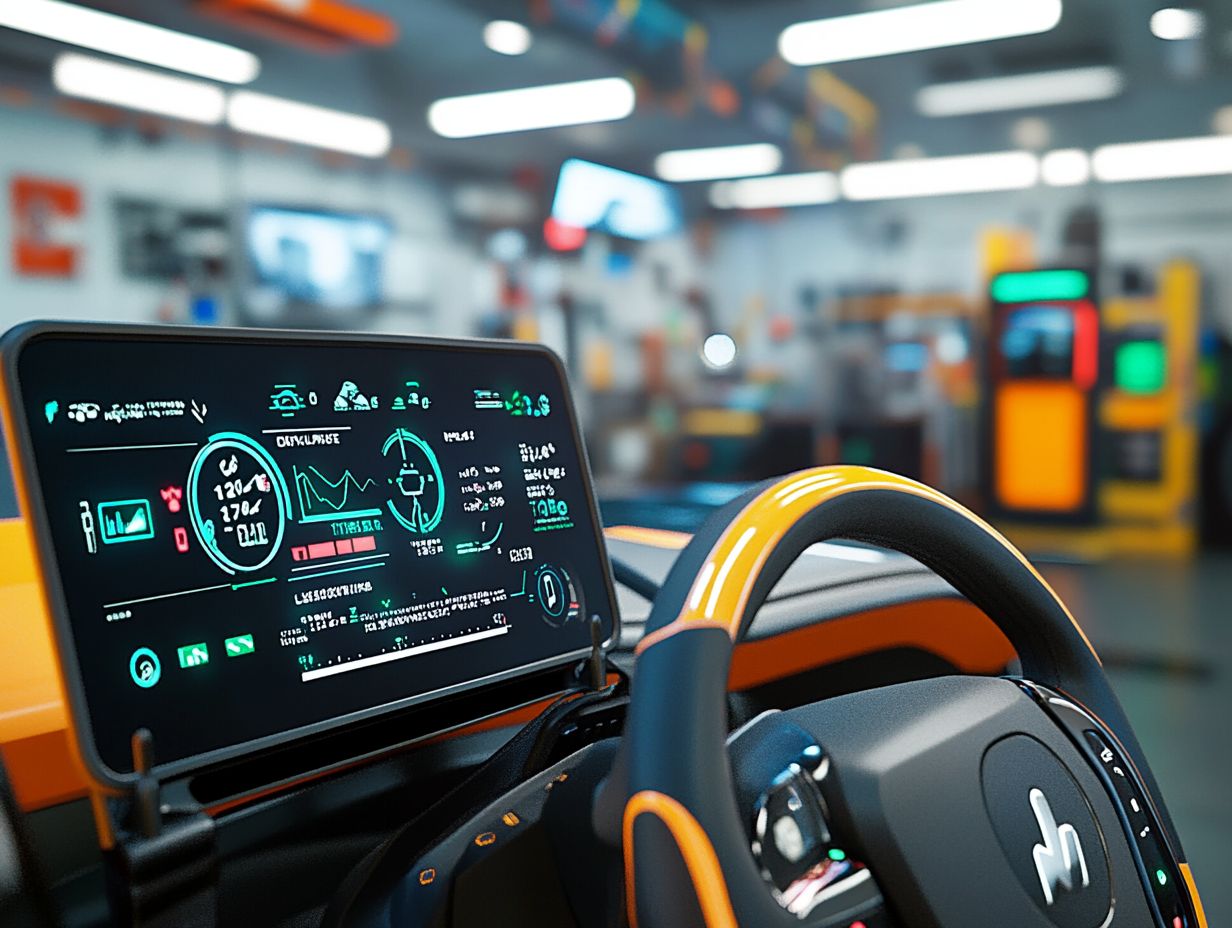
Act now to significantly cut down your EV maintenance costs by adopting various strategies that emphasize preventive maintenance and extend battery life.
By implementing these practices, you ll enhance the longevity of your vehicle and enjoy substantial savings as an electric vehicle owner.
Maximizing Battery Life
Maximizing battery life in electric vehicles (EVs) is essential for reducing long-term maintenance costs and achieving optimal performance.
Integrating advanced battery management systems (BMS) can be a game-changer. These sophisticated systems use methods and state-of-charge monitoring to charge batteries efficiently and safely, significantly extending their operational lifespan.
You can enhance battery longevity by:
- Avoiding extreme temperatures
- Maintaining battery levels between 20% and 80%
- Using regenerative braking (a system that recovers energy when slowing down)
Regularly update your software to optimize energy distribution.
By embracing these preventive maintenance strategies, you can reduce the risk of premature battery degradation and ensure your vehicle remains efficient and reliable over time.
Proper Tire Maintenance
Proper tire maintenance is crucial for your EV, impacting safety, performance, and overall maintenance costs.
These factors are especially important due to the unique weight distribution and torque characteristics of EVs. Keeping the correct tire pressure enhances handling and traction while improving energy efficiency. For example, if your tires are underinflated, you ll experience increased rolling resistance, reducing your vehicle’s range and performance.
Regular tire rotations are also vital. They ensure even wear and extend tire lifespan, preventing premature replacements that can take a toll on your maintenance costs.
By prioritizing these straightforward yet effective practices, you can enjoy enhanced safety, a better driving experience, and increased cost savings over time.
Other Cost-saving Strategies
As an EV owner, there are several cost-saving strategies to enhance your overall maintenance experience.
Make smart use of charging infrastructure take advantage of off-peak electricity rates and strategically locate public charging stations to lower your energy expenses.
Regularly scheduled maintenance is equally essential; it ensures optimal vehicle performance and prevents costly future repairs. Stay informed about the latest industry advancements, including software updates and new technologies, to optimize battery life and boost overall efficiency.
By adopting these approaches, you can take control of your expenses while fully enjoying the benefits of sustainable transportation.
Frequently Asked Questions
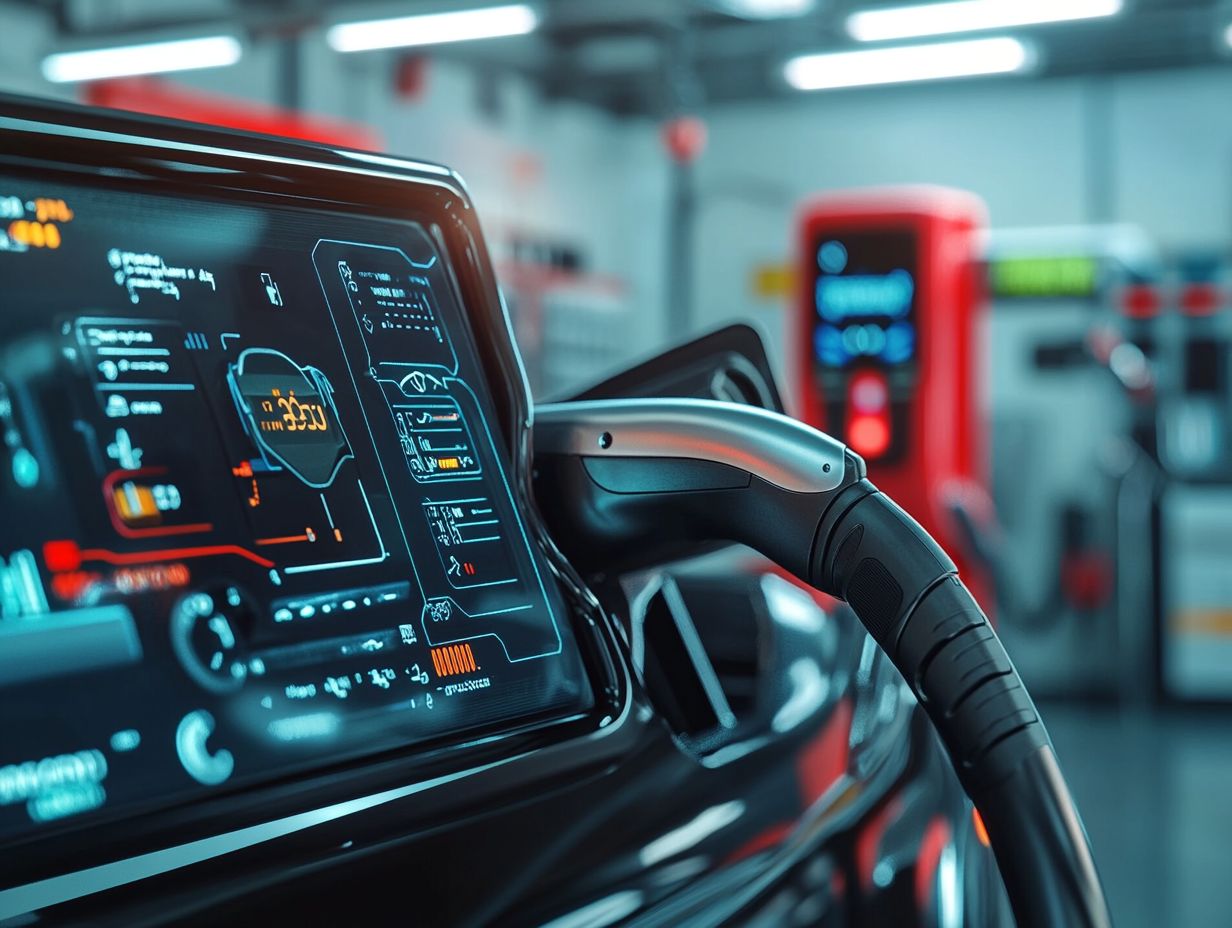
What are EV maintenance costs?
EV maintenance costs include regular upkeep like tire rotations and unexpected repairs.
How do EV maintenance costs compare to traditional gasoline cars?
Overall, EV maintenance costs are significantly lower than those of traditional gasoline cars due to fewer moving parts and no need for regular engine or transmission maintenance, which is outlined in detail in what are the maintenance needs of EVs?
What types of maintenance tasks are necessary for EVs?
Common maintenance tasks for EVs include battery checks and replacements, brake inspections, tire rotations, and regular checks of windshield wipers and cabin air filters.
Are there any potential cost-saving measures for EV maintenance?
One way to potentially reduce costs is to purchase a maintenance plan or extended warranty from the manufacturer, covering unexpected repairs and including regular maintenance at a discounted rate.
Do EVs have any maintenance requirements specific to their electric components?
Yes, EVs have specific maintenance requirements for electric components like the battery pack and electric motor, including regular checks for wear and tear, and potential replacements if necessary.
What should I consider when budgeting for EV maintenance costs?
When budgeting for EV maintenance costs, include regular maintenance and potential repair costs. Also, look into extended warranties or maintenance plans that may help you save money.
Research the specific maintenance needs of the EV model you want. Knowing these details can help you stay prepared and keep your vehicle in top shape!

